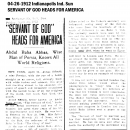Main menu
- ‘Abdu’l-Bahá’s Journey
- World Peace
- Stopping Racism in America
- Empowerment of Women
- More Principles...
- Prayer for America
"Servant of God" Heads for America
‘Abdu’l-Bahá Abbas, Wise Man of Persia, Knows All World Religions.
New York, April 25. — Abbas Effendi, a wise Persian, with the eye of a hawk, straight as an arrow, tall, strongly built, with white turban and raiment, iron gray hair reaching almost to his shoulder, eloquent of speech and intimately acquainted with the sacred books of all the religious of the world, will reach New York this month.
Abbas Effendi, better known as ‘Abdu’l-Bahá Abbas, “The Servant of God,” leader the Bahá’í movement and son of its founder, has spent sixty years of his life in imprisonment and exile. He was born in Teheran on May 23, 1844. His father was Mirza Hossein Ali of Nour, styled by the Báb, the reformer of Islam, as Bahá’u’lláh — “The Glory of God.”
At the age of eight ‘Abdu’l-Bahá Abbas entered upon a life of poverty with his father and family, making in winter a month’s journey to Bagdad, where Bahá’u’lláh, with his party and son, remained for eleven years, announcing himself as “The Promised one,” whose coming the Báb had foretold.
Father and son, with their followers, were banished, via Constantinople and Adrianople, to the prison city of Akka in Syria, where the worst criminals of the Turkish lands were sent. ‘Abdu’l-Bahá Abbas acted as his father’s secretary and bodyguard, seeing many of the visitors who came from the hundreds of thousands of followers to see Bahá’u’lláh. The curiosity seekers were seen by the son and the serious-minded by the father.
When Bahá’u’lláh died in 1892 his mantle fell upon ‘Abdu’l-Bahá Abbas. The Young Turks freed the prisoners in Akka, but the leader remained there with his family until 1910, when he went to Egypt and later to London and Paris. He may go around the world. He does not accept costly gifts, but retains for himself the barest necessities. The Turkish government has made him a small allowance and from this he gives to the poor. His followers say he sets an example of tolerance and love.
It was not until he reached London that ‘Abdu’l-Bahá Abbas would allow the photographers to “snap” him. As the wise man is untaught, his believers affirm that his wisdom is most remarkable. He does not claim miraculous powers. The Bahá’í teachings, according to the followers of the movement, went far toward making possible the international peace race congress in London last year. ‘Abdu’l-Bahá Abbas sent a paper to the congress.
The “Servant of God” is married and has four daughters, three of whom are married. He has no sons and after his death the authority of the movement will be vested in boards elected by the believers.
“The Son of a Prophet,” as he likes to be called, will deliver addresses in Washington before the Second Annual Conference of the Persian American Educational society and will speak in New York also.









